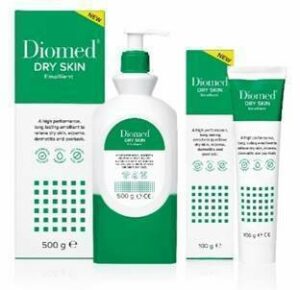By David Saunders, Health Editor | UPDATED: 08:28, 26 June 2020
With up to 15 million people estimated to be living with eczema in the UK, GP Dr Roger Henderson, has shared his simple skincare tips to help sufferers minimise or even prevent flare-ups.
1. Avoid extreme temperatures
Heat can be a source of irritation for problem dry skin conditions, and although sweating is the body’s natural way of cooling itself, sweat contains traces of certain chemicals that can further irritate the skin. One of the best ways to avoid a flare-up is to regulate your body temperature as much as possible.
Keep showers short and cool. If you do get sweaty, try to rinse off and change your clothing as soon as possible. Do your best to keep the insides of your elbows, behind your neck, and the backs of your knees dry and cool, as those are common areas for eczema. Finally, to ease sleep, use light cotton sheets and keep the temperature low during the night.
2. Stay hydrated
Stay hydrated by keeping alcohol intake to sensible levels and drinking plenty of water. Top tip! Carry a cooler with a cold bottle of water everywhere to regulate your body temperature and for hydration.
3. Moisturise, moisturise, and then moisturise some more!

Moisturising is vital to managing eczema. Use a skin-friendly emollient, such as Diomed Dry Skin, generously and regularly, even when skin doesn’t feel particularly dry. Applying emollients immediately after a bath or shower will help to trap moisture in the skin. And remember to pat your skin dry (not rub) before applying as rubbing can cause irritation.
Available over the counter, Diomed Dry Skin Emollient is a clinically proven treatment that combines the performance advantages of an ointment with the cosmetic acceptability of a cream. Its unique gel formulation absorbs quickly, and helps soften, moisturise and protect the skin by trapping moisture and restoring its natural protective barrier.
4. Avoid common skin irritants
Most flares of eczema appear to have no obvious cause but known triggers include many soaps, shampoos, body washes and laundry products. These often contain anionic detergents and surfactants, as it’s what makes them foamy. Try to choose anionic-free products where possible, particularly SLS-free products, most of which are clearly labelled.
If you’re travelling abroad or staying away from home, you might want to bring your own bedding and bath towels to help control allergies, as you never know if you will react to the laundry detergent the hotel uses, for example
5. Don’t sweat the small stuff!
Stress can be a major trigger factor for eczema. This is due to the effect of stress hormones on the body’s immune system, which in turn impacts on skin inflammatory changes.
Try relaxation techniques, such as meditation and yoga. Breathing exercises, creative activities, such as writing or painting, and talking about your stress with family and friends can also help to bring your stress levels down.
6. Get physical
There are many reasons why exercise can help to improve eczema. Not only can it help to lower stress levels, it also keeps the heart, muscles and bones strong and healthy and can boost both energy levels and the immune system.
If you suffer from eczema, try to adapt your workout appropriately. Opt for low-impact workouts during eczema flare ups, wear loose clothing and towel off during exercise.
For further information and expert advice on managing eczema and problem dry skin conditions, visit www.diomed.co.uk.
